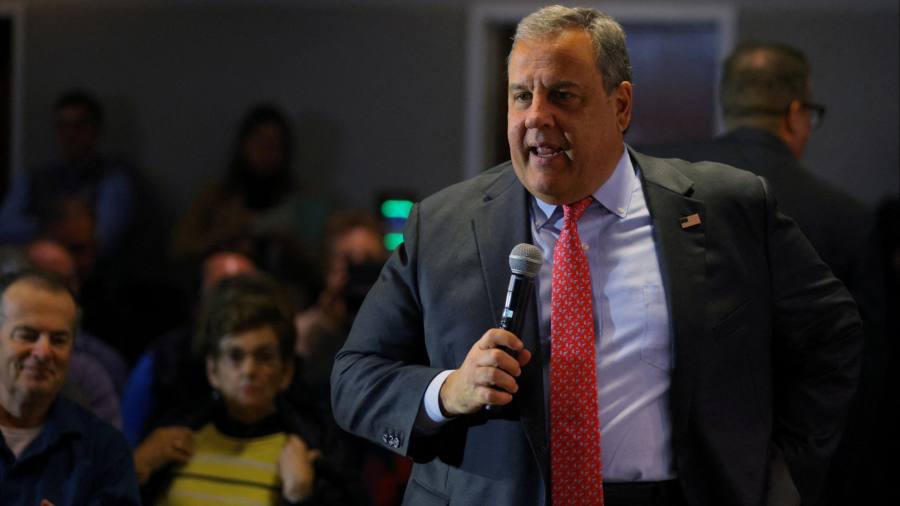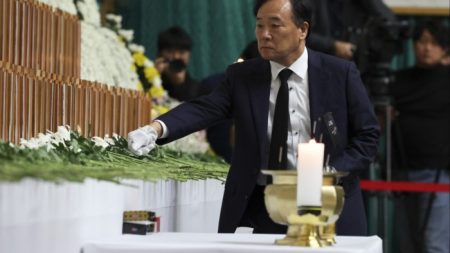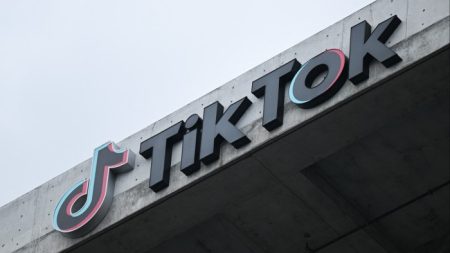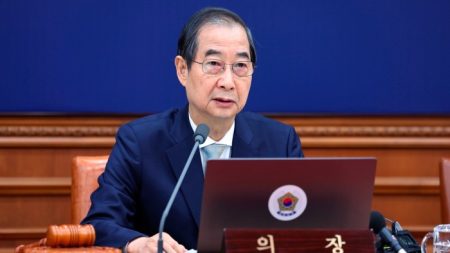Eight years after he first announced he was running for president, Chris Christie is readying for a return to the national stage.
The brash former governor of New Jersey is expected to launch his second presidential run on Tuesday with a town hall-style event in Manchester, New Hampshire, some 300 miles north of his home state.
New Hampshire is a key early voting state, a fact Christie knows first-hand — in 2016, he suspended his presidential campaign after finishing sixth in the primary there.
But people close to Christie — who in the intervening years has gone from close adviser to Donald Trump to one of the former president’s sharpest critics — insist the New England state with a reputation for independent-minded voters is the right place for the tough-talking former governor to launch his long-shot bid for the presidency.
“There is a reason these candidates get better the second time they do it,” said one senior adviser to “Tell It Like It Is”, Christie’s affiliated super Pac fundraising vehicle. “You learn, you get better, you refine your skills. It’s a craft.”
Christie will be the latest in a growing list of candidates vying to challenge Trump for the Republican party’s nomination in 2024, including Ron DeSantis, the Florida governor who ended months of speculation when he entered the race last month.
Mike Pence, Trump’s vice-president, filed paperwork with the Federal Election Commission forming his official campaign on Monday and will kick off his effort with an event in Iowa, another crucial early voting state, on Wednesday.
At the same time, others have abandoned plans to run, arguing anti-Trump Republicans need to coalesce around one candidate rather than risk a repeat of 2016, when a fractured field allowed Trump to shore up his own base of support and secure the delegates needed to win the party’s nomination.
“We must not be complacent, and candidates should not get into this race to further a vanity campaign, to sell books or to audition to serve as Donald Trump’s vice-president,” Chris Sununu, the Republican governor of New Hampshire who for months has toyed with his own run, wrote in an op-ed in the Washington Post on Monday.
Critics question whether Christie, Pence and other challengers — including Nikki Haley, Trump’s former ambassador to the UN, and Tim Scott, the Republican senator from South Carolina — have a plan for winning the party’s nomination.
The latest average of national opinion polls from RealClearPolitics shows Trump enjoys the support of more than half of Republican voters, followed by DeSantis with just over 22 per cent. The rest of the candidates languish in the single digits.
“Any time a candidate gets into a race, they should have a very clear sense of who their constituency is and how they win,” said Kevin Madden, a senior partner at Washington consultancy Penta who was a senior adviser to Mitt Romney’s 2012 presidential campaign. “I don’t get any of that from any of them right now.”
Non-partisan analysts say Christie, who is no stranger to controversy, may have a tougher task than most. When he was governor in 2013, his aides were accused of orchestrating a scheme to create a traffic jam to punish a political opponent, in a scandal known as “Bridgegate”.
A University of New Hampshire poll this year found just 10 per cent of Republican primary voters in the state had a favourable opinion of Christie. By comparison, 63 per cent had a favourable view of DeSantis, and 59 per cent had a favourable view of Trump.
“The numbers speak for themselves: a lot more Republicans dislike him than like him,” said Dante Scala, a political science professor at the University of New Hampshire.
Christie’s divisiveness with the Republican grassroots is in part down to his thorny relationship with Trump. He was among the first national Republicans to endorse Trump after dropping out of the primary field in 2016 and was later vetted as a possible running mate.
He was tapped to head Trump’s transition team, only to be fired from that role before inauguration day amid conflict with Jared Kushner, the president’s son-in-law. He continued to advise Trump throughout his presidency but fell out with him over his efforts to overturn the 2020 presidential election.
“Is there a Chris Christie electorate still left in this Republican party, the kind of people that want to vote for a moderate, centrist, north-eastern Republican governor?” asked one longtime Republican strategist who knows Christie well. “Do they participate in Republican primaries any more? Or are they now either independents or Democrats? Is he still in the party but his voters aren’t?”
Some anti-Trump Republicans have been buoyed by the prospect of a Christie candidacy, hopeful that the combative former governor will be willing to attack Trump directly in a way that the other candidates will not.
Christie, who helped Trump prepare for debates in 2016 and 2020, is widely seen as having destroyed the 2016 campaign of Marco Rubio, the Republican senator from Florida, with a devastating primary debate performance.
The first televised debates for 2024, organised by the Republican National Committee, are scheduled for late August. Trump has not committed to participating.
Christie insists he is not a “paid assassin” with a candidacy designed to take out Trump. He told Politico in an interview this year: “When you’re waking up for your 45th morning at the Hilton Garden Inn in Manchester, you better think you can win, because that walk from the bed to the shower, if you don’t think you can win, it’s hard.”
Mike DuHaime, a veteran Republican strategist and longtime Christie ally, said the former governor is not on a “kamikaze mission”, adding that “more than half” of Republican voters were “looking for an alternative, someone who can take it to Trump with a better vision for the future of the country”.
“It doesn’t seem any of the other candidates have the courage to really take on Trump directly the way Christie does,” DuHaime said.
Still, others remain sceptical.
“The idea of watching Christie on the stage with Donald Trump is appealing to lots of folks, and it would be appealing cable television,” said Scala of the University of New Hampshire. “But I struggle to see, beyond that, what his path is. It is a path to a niche audience, not the nomination.”
Read the full article here













